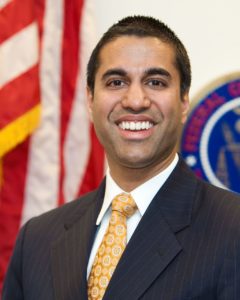In recent months, net neutrality has come under fire from the Federal Communications Commission, or the FCC.
Net neutrality is defined as the rule that Internet service providers (ISPs), such as AT&T, Comcast, and Verizon, treat all online data equally without discrimination by content, device, platform, or user. While net neutrality has been a source of contention as early as the 1990s and the genesis of online networking, under President Obama the FCC in 2015 established net neutrality regulations that would enforce the open Internet principle. These regulations came to be known as Title II.
In 2017, however, under President Trump FCC Chairman Ajit Pai, appointed by Donald Trump, began arguing in favor of repealing Title II. According to Pai, net neutrality regulations were “heavy-handed” and overly restricted opportunities for ISPs and related businesses. “The internet wasn’t broken in 2015,” he said. Before Title II, “we were not living in some digital dystopia. The main problem consumers have with the Internet is not and has never been that their Internet provider is blocking access to content. It’s been that they don’t have access at all.”
Yet the general consensus, according to a bipartisan 83% majority polled by the University of Maryland’s Program for Public Consultation, supports Net Neutrality — this principle of free and open Internet usage.
While it is true that the Internet in 2015 was indeed functional and largely similar to what we have today, Pai’s assumption that consumers have never had a problem with ISPs blocking content is false. In 2012, for example, AT&T blocked FaceTime on iPhones that were not subscribed to a premium data plan, a move that resulted in enormous backlash from consumers. 2014 saw both Verizon and AT&T accused of slowing connections for users with unlimited data plans after they met a certain “threshold” of data used; for AT&T, connections would be slowed after two gigabytes of data were used within a month. As the internet becomes more and more essential to communications, work and leisure, instances like these make net neutrality regulations seem, to many, necessary, as blocking and throttling certain content is in violation of net neutrality.

photo courtesy of Wikimedia Commons
With Title II repealed, however, many fear that ISPs will create what are called Internet “fast lanes,” which would prioritize specific websites and services. This also means that ISPs could charge websites and website hosts charge an additional fee to a consumer to access the fast lanes and maintain a more stable connection. Additional fees, in turn, are likely to be transferred onto consumers who want to visit sites that buy into fast lanes.
Even within the FCC itself, opinions are conflicting. Commissioner Michael O’Rielly was supportive of giving certain sites and services preferential treatment. “I am hopeful that if Congress does go down this path it will see merit in rejecting the ban on paid prioritization,” he said. “I, for one, see great value in the prioritization of telemedicine and autonomous car technology over cat videos.” Yet Pai dismissed worries of fast lanes, perhaps in an attempt to gain support over the controversial repeal. He said, “[Establishment of fast lanes] didn’t happen before the Obama Administration’s 2015 heavy-handed Internet regulations, and it won’t happen after they are repealed.” Of course, there is no way for Pai to predict the actions of ISPs after the repeal of net neutrality, making his statement more of a contrived ambition than a guarantee.
Pai’s bold assumption that ISPs would not create fast lanes follows his already peculiar history in responding to backlash. For example, in Pai’s defensive video titled, “7 Things You Can Still Do On the Internet After Net Neutrality,” he uses lightsabers, a dog, and outdated memes to simultaneously mock critics of the net neutrality repeal while blatantly ignoring the main points of said critics.
Now that net neutrality has officially been repealed, one might wonder: what now?
FCC Commissioner Jessica Rosenworcel, who voted against the repeal, told NBC news that “The open internet as we know it could change. Perhaps not immediately, but over time. And I think that’s troubling.”
Lick-Wilmerding’s Troy Yochelson offered insights into what could change after net neutrality’s repeal. “For example, Comcast as an ISP is supposed to provide access to all traffic streams equally. But Comcast is also a video provider; they also provide entertainment, like Netflix or Hulu. So now Comcast can say, ‘Well, if you want to watch your Netflix streaming, you’d have to pay more to do that. It’s not enough that you bought the streams for us; now you must pay for it. But you don’t need to pay more if you stream our own services.’
“I don’t think the repeal is likely that it will affect Lick immediately,” Yochelson continued, “as our provider, MonkeyBrains, is committed to net neutrality. I don’t think there’s going to be any direct impact, but if the larger ISPs who do not support net neutrality begin tightening services and service access, we may find that things we utilize are limited in speed. For example, I don’t know if Netflix has their own service provider or uses services provided by other groups, but we may be required to pay for the traffic by Netflix to the MonkeyBrains network access point.”
Even months after the repeal, no drastic changes have been made to the Internet and its operations. With the rules gone, however, ISPs are now free to test their power in blocking content or creating fast lanes – and some think that the probability of this happening grows by the day. Harold Feld, a pro-neutrality lawyer, told The Verge, “The history of net neutrality is that whenever you get rid of the rules, one of the carriers does something stupid that makes people very upset.”
Over 20 state attorneys from states including California, Virginia, and New York have already filed a protective petition for review in an effort to sue the FCC. The filing requests that the U.S. Court of Appeals for the D.C. Circuit examine the FCC’s decision and determine its legality or, for that matter, constitutionality.
Senate Democrats have introduced a resolution to overturn the FCC’s repeal through the Congressional Review Act, which allows the Senate by a majority vote to overturn a decision by a federal agency. All 49 Democrats and one Republican are in support of the resolution, meaning that one more vote is needed for the resolution to pass with a majority of 51. However, the House of Representatives would need to pass a similar resolution, and Speaker Paul Ryan could bring the efforts to a halt. Perhaps the greatest obstacle is Donald Trump himself, who would have to sign the resolution in order for it to go into effect. Yet the White House has already expressed its support for the net neutrality repeal, making the Senate Democrats’ attempts unlikely.
Opponents of the reveal are searching for workarounds to negate the impact of the FCC’s repeal. Montana Governor Steve Bullock (D) has already signed an executive order that requires ISPs with state contracts to comply with the state’s net neutrality principles, making it the first state to implement its own net neutrality policies and stand up to the FCC’s decision. “Because there’s no mandate, and no new regulations, there’s certainly no federal preemption,” reads the a fact sheet prepared by Bullock. “Companies that don’t like Montana’s proposed contract terms don’t have to do business with the State.”
Montana’s revolt against the FCC’s action is joined by other states.: New York Governor Andrew Cuomo signed a similar executive order to protect net neutrality in New York, ordering ISPs with state contracts after March 1 to adhere to net neutrality principles. “The FCC’s dangerous ruling goes against the core values of our democracy,” said Cuomo, “and New York will do everything in our power to protect net neutrality and the free exchange of ideas.” California is likely to follow shortly, as State Senator Scott Weiner from San Francisco has introduced a bill similar to Montana’s and New York’s. “Today, as the Legislature reconvenes, I’m formally introducing legislation to adopt #NetNeutrality in California,” Weiner stated on Twitter. “We will protect a free and open internet in our state. We won’t let the FCC undermine our democracy.”






